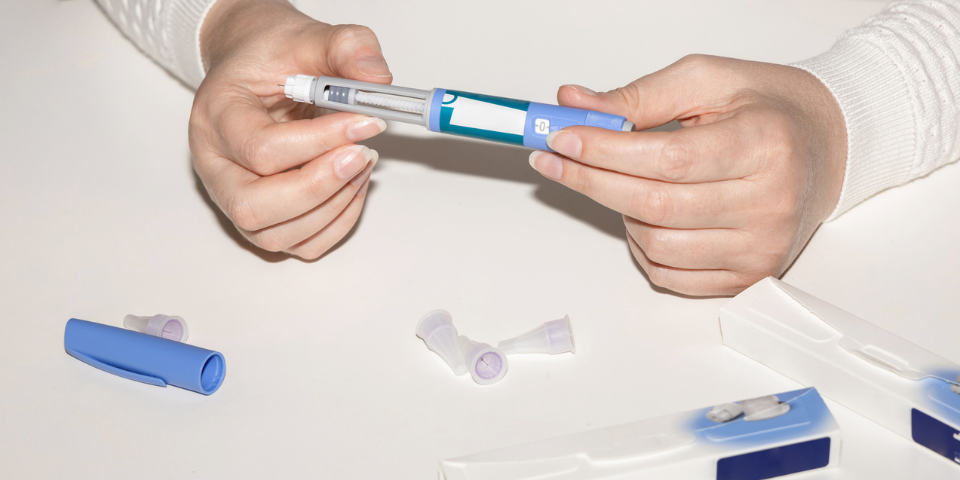If you’re looking for ways to boost your weight loss journey, you may have come across incretin mimetic drugs like Mounjaro, Ozempic, Rybelsus, Wegovy, and Zepbound. Many people have seen significant weight loss results with these medications.
But what happens when you decide to stop taking incretin mimetics for weight loss? Will you regain the weight you lost, or do you need to keep taking them indefinitely to maintain your progress?
In short, when you stop taking incretin mimetics, it is likely that you will regain most of the weight you lost.
This can be disheartening, especially considering the potential drawbacks of long-term usage. Not only are these medications expensive — with Mounjaro and Ozempic costing around $1,000 per month — but the long-term effects of these drugs are still being studied. It's essential to carefully consider the risks and benefits before deciding if incretin mimetics are the right choice for you. And as always, consult your doctor before starting or stopping any medication.
If you are thinking about using incretin mimetics for weight loss, here is some information you should know.
How Do Mounjaro and Ozempic Work?

Mounjaro, Zepbound, Ozempic, Rybelsus, and Wegovy work by imitating metabolic hormones called incretins, hence the term incretin mimetics.
This imitation of hormones helps the body regulate healthy blood sugar levels, reduce appetite, and control food intake by promoting a feeling of fullness after eating. Consequently, many individuals experience weight loss as a secondary outcome.
While these drugs share similar mechanisms of action, there are differences in how they work and their intended purposes.
Semaglutide mechanism of action
These medications, developed by Novo Nordisk, contain semaglutide as the active ingredient. Semaglutide mimics the glucagon-like peptide-1 (GLP-1) hormone, which aids in insulin production, digestion slowing, and appetite suppression.
Ozempic (injection) and Rybelsus (pill) are FDA-approved as primary treatments for type 2 diabetes. However, they are sometimes prescribed off-label for weight loss.
On the other hand, Wegovy is an FDA-approved injectable form of semaglutide specifically designed for weight management in adults with obesity or overweight individuals with weight-related health conditions.
Tirzepatide mechanism of action
Mounjaro and Zepbound contain tirzepatide as the active ingredient. Similar to semaglutide, tirzepatide mimics the GLP-1 hormone and enhances insulin sensitivity. Additionally, tirzepatide's mechanism of action imitates the gastric inhibitory peptide hormone (GIP), which helps regulate insulin secretion, appetite, and satiety.
Studies have shown that tirzepatide can lead to more significant weight loss compared to semaglutide due to its effect on two receptors instead of one.
Mounjaro and Zepbound, both administered through weekly injections, are manufactured by Eli Lilly. While Mounjaro is approved for diabetes treatment, Zepbound is intended for weight management in adults with obesity or overweight individuals with weight-related health conditions.
Similar to Ozempic and Rybelsus, Mounjaro may be used off-label for weight loss.
What Happens When You Stop Taking GLP-1 Drugs for Weight Loss?

Incretin mimetics can aid in weight management while being used. However, once you discontinue these drugs, your metabolic function will return to its pre-medication state, potentially leading to weight regain.
Here are some common effects of stopping Mounjaro, Ozempic, and similar medications:
1. Your appetite will increase
The primary weight loss mechanism of incretin mimetics is appetite suppression and delayed stomach emptying. When the medication is stopped, your appetite will return to normal, and stomach emptying will resume at a regular pace, potentially causing an increase in food consumption.
2. Weight regain is likely
With your appetite back to normal, monitoring your calorie intake becomes crucial to prevent weight gain. Studies have shown that participants regained a significant portion of the lost weight within a year of stopping incretin mimetics.
3. Blood sugar levels may rise
Upon discontinuation of incretin mimetics, insulin secretion reverts to its previous state, leading to potential increases in blood glucose levels. Research has indicated that individuals may experience elevated blood glucose levels and weight gain shortly after stopping treatment.
Can You Just Stop Taking Mounjaro and Ozempic?
Due to the impact of long-term drugs like semaglutide and tirzepatide on the body, abruptly discontinuing them without medical guidance is not recommended. While there is no evidence of severe withdrawal symptoms, research suggests that individuals may experience rapid increases in blood glucose levels and weight gain after stopping incretin mimetics.
It may be possible to maintain weight loss achievements after ceasing semaglutide and tirzepatide, but it is essential to do so under the supervision of a healthcare provider.
Preserving weight loss after quitting incretin mimetics
Once you have reached your weight loss goals, it may be possible to stop taking semaglutide and tirzepatide without significant weight regain.

